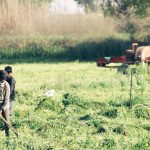In an enlightening discussion hosted by the Oxford Climate Society, two leading figures in the environmental movement, Mary Robinson and Vandana Shiva, shared their insights on climate justice, biodiversity, and the role of science in our understanding of the natural world. The conversation was a rich tapestry of ideas, weaving together the threads of policy, activism, and indigenous knowledge.
Mary Robinson, former President of Ireland and UN High Commissioner for Human Rights, is a renowned advocate for climate justice. She has dedicated her career to human rights and has been instrumental in bringing climate change to the forefront of the global agenda. Robinson’s approach to environmental issues is deeply rooted in her legal background and her belief in the power of governmental reform and legislation.
On the other hand, Vandana Shiva, an Indian scholar, environmental activist, and food sovereignty advocate, has taken a more grassroots approach. Shiva’s work is grounded in empowering local communities and promoting biodiversity-based solutions. She champions the knowledge and wisdom of indigenous peoples and farmers, arguing for a shift from a commodity model of agriculture to a health model.
Throughout the discussion, both Robinson and Shiva emphasized the importance of integrating different knowledge systems in our approach to climate change. Shiva critiqued the Western-enforced narratives of civilization that have led underdeveloped countries to industrialize in an attempt to catch up. She argued for the decolonization of knowledge and the recognition of the pluralism of science.
Robinson, meanwhile, highlighted the need for gender balance in leadership roles, citing the effective management of the COVID-19 crisis by women-led countries. She argued that women’s leadership is vital for making key decisions going forward.
The conversation also touched on the controversial topic of offsetting, with both speakers expressing concerns about its implementation. Shiva criticized the idea of offsetting as a Cartesian idea, arguing that every ecosystem needs to function in full integrity with full diversity. Robinson echoed these sentiments, emphasizing the need for policies that move us away from a broken system leading to a climate catastrophe.
In conclusion, both Robinson and Shiva offered advice to young and passionate individuals seeking to make an impact. They encouraged continuous learning, openness to the ideas of others, and resilience in the face of growing challenges. They emphasized that no work is too small to make a big difference and that everyone can contribute to the ever-expanding circles of transformation.












